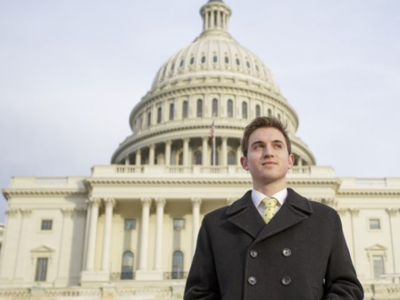Now more than ever, younger generations seek change. We want to make our voices heard and we want our values represented by the officials elected into office, whether our state attorneys or our country’s president. You can see college students everywhere trying to spark active change, from posting on social media, to donating and signing petitions, to voting and even protesting. However, you can take your efforts a step further with the perfect opportunity to help make an impact in your community: interning for a political campaign. Now many of you may think to yourself one of three things: “I’m not a political science major,” “I don’t want to be a politician” or “I don’t really know much about politics or being a politician.” Fortunately, none of these things prevent you from engaging in this opportunity.
Keep reading to understand what it takes to intern for a political campaign.
What It’s Actually Like

In our eyes, we see elections and political campaigns as very serious and important for our country. Unfortunately, people who don’t know much about them may also see the campaign process as something very mysterious and complicated. If you make a quick Google search on the subject, you’ll find the exact opposite of this.
Political campaigns serve to constantly connect candidates with the people. With the pursuit of getting elected, candidates constantly keep communities informed on their values, platforms, events and voting in general. “I hope that as time goes on, campaign work is demystified. It’s nothing out of this world,” said Damon Veras, University of Florida sophomore and campaign intern. “It’s really just following up with people, putting yourself out there, putting in the work and just trying your best to stay in contact with your voters and donor bases.” As an intern, you’ll find yourself spending most of your time connecting with others, whether on the phone, through community events or going door-to-door.
This type of internship will sometimes require long hours, as well as a lot of dedication and independence, especially when working on a larger campaign. Every day you’ll see your communication and persuasion skills put to the test. You must successfully sell your candidate’s platform and convince people to either vote for, donate to or endorse the campaign you intern for. However, you will find the work worthwhile with the opportunity you get to directly make the changes you want to see.
Cool Stuff You Get to Do

Political campaigns offer numerous opportunities and responsibilities interns get to take advantage of. Campaigns function with the help of several different departments. These include finance, logistics, communications and outreach. The campaign structure allows interns of all interests and backgrounds to gain valuable experience in an array of different fields. “Even though you may have a particular responsibility given to you at the beginning of the campaign, that can change. Sometimes you end up doing things outside of your sphere. A lot of the time, all of our jobs intersect in one way or another,” Veras said. Most political campaign interns will start off as field organizers. This position encompasses the on-the-ground work you’ll most often hear about. These individuals maintain the closest relationship to voters. Also, it affords you an opportunity to get to know the people in your community, their opinions, values and things of that nature.
Your opportunities may also vary depending on the campaign you work for. When working for smaller campaigns, like for county or city positions, you get to interact more directly with the general voter population, as well as with your superiors. With bigger campaigns, like for governor or congressional positions, you’ll find fewer opportunities to interact with individuals in higher positions. However, with a more ‘glamorous’ reputation, these campaigns can offer more excitement as you work with people who can easily put a face to a name.
Depending on the department you intern for, your duties within a campaign can also vary. No two experiences will end up the same. Financial interns get to focus on spearheading fundraising events, doing donor research and getting into contact with donor bases. Communications interns help with endorsements and even social media promotion for the campaign. These specific roles offer you the chance to explore multiple interests. Also, you’ll witness how different fields intersect within the world of politics. Ultimately, you can find endless opportunities within a political campaign. You should make sure to keep an open mind because of that. You may end up trying something completely new and fall in love with it.
What You’ll Learn

As a political campaign intern, you become engrossed in a constant learning experience. Especially if you never participated in a campaign before, you will learn something new every day. Overall, the most important knowledge you’ll gain will revolve around politics and networking. Obviously, that first thing seems like a given. You’d expect politics to stand as an important part of a political campaign. To expand on that, within the realm of politics you’ll get the opportunity to learn about several different things. These include the way political campaigns and elections function.
You’ll also learn a lot about the political views of different communities around you. “I’ve gotten to talk and meet lots of people. I’ve been able to really learn the politics of where I call home and what people are passionate about, which is very valuable to me,” said Alvaro Perpuly, Yale University sophomore and community and outreach coordinator for Daniella Levine Cava’s county mayor campaign. In terms of meeting people, as a political campaign intern, you’ll learn a lot about networking and its impact. Whether voters, donors or political officials, you will constantly interact with different people in your position. Within networking, you will learn how to communicate in many different ways. You’ll go from informing voters, to persuading donors, to forming relationships with political officials and above all marketing yourself for future opportunities.
How to Prepare for Your Application

If you decide to pursue a career in politics, you’ll find the application process for interns a bit more informal than that of full-time, paid positions. Granted, this varies depending on the type of campaign you apply to. Larger, federal or statewide, campaign internship applications will likely fall on the more formal side, especially due to high competition for these positions. You’ll encounter a simpler process when applying for smaller campaigns due to the greater amount of lower-level positions available during elections. Also, these smaller campaigns need all the help they can get, making them more eager to accept interns and volunteers.
Generally, though, the application process consists of you sending an email of interest to the campaign and then scheduling an interview. Some campaigns may also ask you for your resume. You may want to consider sending your resume regardless of when reaching out to a campaign. Yes, even if they don’t specifically ask for it. You can choose a few different ways to prepare for this type of experience. Your preparation will depend on how much in advance you decide to prepare. For those of you who need to prep for your interview next week, it’s too late for you.
Just kidding. When preparing, conducting external and internal research goes a long way. External research involves informing yourself about the campaign you want to intern for. You should try and develop an in-depth understanding of their platform. On the other hand, internal research refers to recognizing your own values. Consider your motivation to apply and participate in the internship. “If you have no experience in a campaign but when I talk to you I see that you’re very dedicated, interested, driven and are willing to put that extra mile in,” Perpuly said, “but also that you have reviewed the candidate’s policies and are familiar with and believe in them, that also makes things even easier. When someone is not only dedicated, but believes in the campaign’s values and vision, that really says a lot.” You can get your foot in the door regardless of your previous experience, or lack thereof.
If you don’t plan on applying for a political campaign right now, but want to in the future, you can definitely start preparing in advance. Most universities offer involvement opportunities for students to gain applicable experience. These include everything from political party chapters to social justice or issue-based clubs. “Definitely get involved in that, as in interviews you definitely will be asked about any political experience you have and these would be good things to bring up,” University of Miami law school student and previous campaign staffer Chelsea Olivera said. “These clubs in college also provide an opportunity to do things like phone banking and voter registration and you can then say you’ve gotten this kind of experience.” You don’t need to participate in a political campaign prior to applying for your internship to get the applicable experience.
Student government provides another great resource you can utilize at your university. By running for a position, you get your own personal campaign experience. If elected, you’ll learn about policymaking, advocating and government procedures. Although, you should make sure you devote your time to things you actually care about. Don’t just pursue things to boost your resume. “Join an organization with a cause you are passionate about and seek ways to advocate for the cause. For example, research local, state and federal elected leaders who support your cause and reach out to them via email, social media or simply call them,” Mayor Claudia V. Cubillos said. For this type of internship, your preparation will depend heavily on the amount of initiative and time you take to learn, no matter the way you go about doing it.
Skills That Impress Them

Clearly, political campaign internships offer a lot of different opportunities. This provides room for a broad, yet applicable, skill-set. “There are a lot of different types of skills that impress, although, most of them are expected for all applicants. A clear communicator and someone who’s savvy in social media and analytics is great. Interns should be eager to serve the community, have a passion towards local government and public service,” Cubillos said. Social media provides the perfect tool to connect campaigns to their audience and also learn more about them.
Nowadays, social media offers one of the most vital resources. Proficiency in it will definitely give you an advantage. Although seemingly obvious, explaining your passion will truly make a difference in your interview. It demonstrates a sincere motivation for applying. “They should also show a willingness to learn, respect and reliability,” Cubillos said. “We also want an intern that’s a go-getter, self-starter, motivator, flexible and have strong follow-through skills and discreetness. Political campaign internships include a lot of independent work. Conveying these skills in an interview will speak volumes, showing a candidate up for the challenge.
Cool Perks

Besides getting the opportunity to help influence the future of your communities (a perk in of itself), political campaign internships provide other unique perks. Many of the perks you’ll receive come from the connections you’ll make within the world of politics. You’ll find many valuable resources and opportunities within politics. However, you may not get the chance to hear about them. This will change once you get more involved in the oftentimes exclusive political community. Once involved, though, you’ll get the chance to mingle with a variety of different individuals. “I’ve gotten to meet lots of people in politics, even at the national level, like people in congress and senators. It’s so cool to see people I watch on TV all the time right in front of me and be able to go talk to them,” Perpuly said. While not getting star-struck may take some practice, this reward proves worthwhile.
Regarding future opportunities, like law school, political internships and government positions, the specific campaigns you work for can also help you out at one point or another. “Having a politician’s name on your resume looks good in other fields as well. When I applied to law school, that was a huge perk. I worked for a state senator and the school I applied to fell under their district. During my interview, they recognized the senator’s name, so it does make a huge difference,” Olivera said. Anyone will tell you that the connections you make as a political campaign intern truly becomes the most valuable aspect of your internship.
The Deets

Due to the variability of experiences within political campaigns, you’ll often find a lack of consistency in the details of these internships. Consequently, your time commitment will definitely vary. Bigger federal and state-wide campaigns will feel like full-time jobs. These campaigns often take more time than smaller ones. Also, you’ll have to connect with much larger voter populations (think hundreds of thousands of people). Smaller city or county campaigns don’t require the same time commitment. Within these campaigns, you handle much smaller regions and shorter campaigns. The over-achievers out there (yes, you) can even potentially double-up on these smaller campaigns.
To anyone considering a political campaign internship, which by now you should, remain aware of the terrain you will step into. Politics sometimes functions differently from other fields you explore. Networking will remain vital both within and outside of your internship. “One thing that people need to know about politics is that it is all about who you know. There is no job board where jobs are posted. You either know someone affiliated with a campaign or get involved and meet people yourself,” Olivera said. It all may seem a bit stressful to navigate at first. However, you just need to put in a bit of time and energy. You may end up surprising yourself with the opportunities you receive and the people you meet along the way.



















